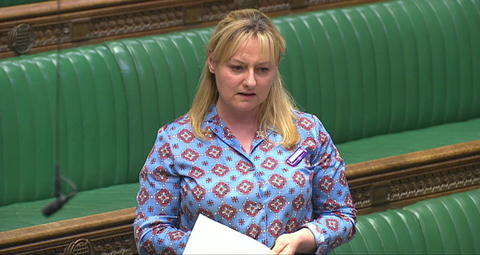BY No Author | July 19 2019 | ![]() 0 COMMENTS
0 COMMENTS ![]() print
print

Abuse and threats of deselection: the price of being a pro-life MP
Publication Date: 2019-07-19
By Daniel Harkins and Peter Diamond
An MP has received threats of violence, a deselection campaign by local party members, and horrific abuse, including being sent images of rape, after she voted against abortion.
Dr Lisa Cameron, the SNP MP for East Kilbride, Strathaven and Lesmahagow, endured days of abuse after she voted against an amendment at Westminster last week to introduce abortion to Northern Ireland.
Dr Cameron has sought and received assurances from chief whip Patrick Grady MP, a Catholic, that the vote was a free, conscience vote.
Questions are now being asked of the SNP leadership and why it has refused to comment on one of its female MPs being abused and threatened. The Catholic Church in Scotland has written to the First Minister seeking clarification that no repercussions will be taken against MPs who vote with their conscience.
Political crisis
Abortion policy is devolved to the north, but MPs took advantage of a political crisis and the suspended Stormont Assembly to pass the measure, which will only come into force in October if devolution remains suspended.
Only eight Scottish MPs voted against the amendment: Lisa Cameron and Peter Grant from the SNP, and Kirstene Hair, Stephen Kerr, John Lamont, Douglas Ross, David Duguid and Ross Thomson from the Scottish Conservatives.
Religious beliefs
Dr Cameron said the ‘traumatic’ and ‘horrific’ abuse began shortly after the vote, but increased after she posted on Facebook explaining that she’d voted based on her experience of having two late term miscarriages, and her Church of Scotland religious beliefs.
“As soon as I put the post up I was deluged by hateful responses,” she told the SCO. “People were really abusing me and my decision, saying that I endorse rape of women, sending me pictures of rape scenes and aborted foetuses and telling me I should be aborted myself.”
She added that she was shocked by the lack of support from within the SNP leadership. “I felt very alone and my family and I felt like we were left to deal with this ourselves, despite it being a vote of conscience.”
Vote of conscience
At the time of the vote, First Minister Nicola Sturgeon and SNP Westminster leader Ian Blackford indicated that they were in favour of the amendment.
However, SNP MPs were informed they were free to vote with their conscience.
Despite this, Dr Cameron said that since the vote, former and current party officials, including those involved in vetting candidates to stand for election, have indicated that they wish to see her removed from office. She said one had commented that no one with pro-life views should be a candidate at an election.
Fears
Dr Cameron said the pro-life debate has descended into ‘such a no go area’ that MPs are ‘frightened to vote with the way their conscience tells them.’
“I think people are too frightened to come forward and talk about what they believe because they know they will be vilified, particularly if they have a religious Faith,” she said.
“That is something [the abuse] focused on. It’s almost like tolerance of religious beliefs is now excluded from our politics. Politics is toxic for people who are religious. You have to hide it.”
Question for SNP leaders
On Wednesday, after the SCO went to press, the Church in Scotland issued a letter to First Minister Nicola Sturgeon seeking reassurance that freedom of conscience will be protected within the SNP.
Bishop Hugh Gilbert, president of the Bishops’ Conference, wrote: “I believe I write on behalf of all who cherish freedom of conscience within the public square and hold in high regard those in public life who remain true to their conscience, even at the expense of personal popularity or political advantage.”
Bishop John Keenan of Paisley Diocese previously told the SCO that people are waiting for a response from the SNP leadership to the abuse Dr Cameron has received.
Lack of support
“When a woman politician is abused in this way—for example people calling for her to be aborted—then you would expect the leadership of the party to immediately come out and defend her publicly and offer her support,” he said.
“They should say, first of all, that Lisa was entitled as an MP to vote the way she did, and that her freedom to do so is respected within the party and that they deplore anyone who would have abused her.”
“We hear there are suggestions that elements of her local party have begun a campaign to deselect her because she voted pro-life. It would be unacceptable for the SNP to do so and it would suggest that the SNP is a de facto pro-abortion party.”
Christian oppression
Bishop Keenan added that in UK politics there is an ‘oppressive public spirit against Christians and against basic Christian reality in matters of life.’
“In these circumstances it is even more important than ever that politicians ensure that views are heard in good faith and that they don’t align themselves with a growing oppressive spirit and stop Christians from making their own reasonable contributions to pubic debate.”
‘deeply held views’
Speaking after the vote, Peter Grant, the only other SNP MP to vote against the plans, said: “I welcome the fact that the SNP recognises that there are sincere and deeply held views on both sides of the abortion debate and has a very long standing position of allowing our elected representatives to vote according to our consciences.
“I believe that life in the womb is human life and I believe in the equality of all human lives. I cannot in conscience support legislation that I believe would allow the deliberate ending of human life, whether before or after birth.
“Many of my colleagues have a different understanding of the nature of life in the womb and have come to the conclusion that they support legalised abortion. I respect their right to act and vote according to their sincerely held views.”
Persecution
John Deighan, chief executive of the Society for the Protection of Unborn Children (SPUC Scotland), condemned the treatment of Dr Cameron.
“The persecution of an elected politician for voting in a way they don’t like exposes the depth of their intolerance. It’s a disgraceful and unacceptable position that has been deliberately cultivated,” he said.
Calls to the SNP went unanswered, however, an unnamed spokesperson previously told media: “As has been longstanding practice in the SNP, votes on this issue are conscience votes for elected members, meaning it is entirely up to the individual member how they vote.
“No one is failed at assessment because of their religious views. Ordinary party members may disagree with the actions of an SNP parliamentarian, but they should do so respectfully.”










